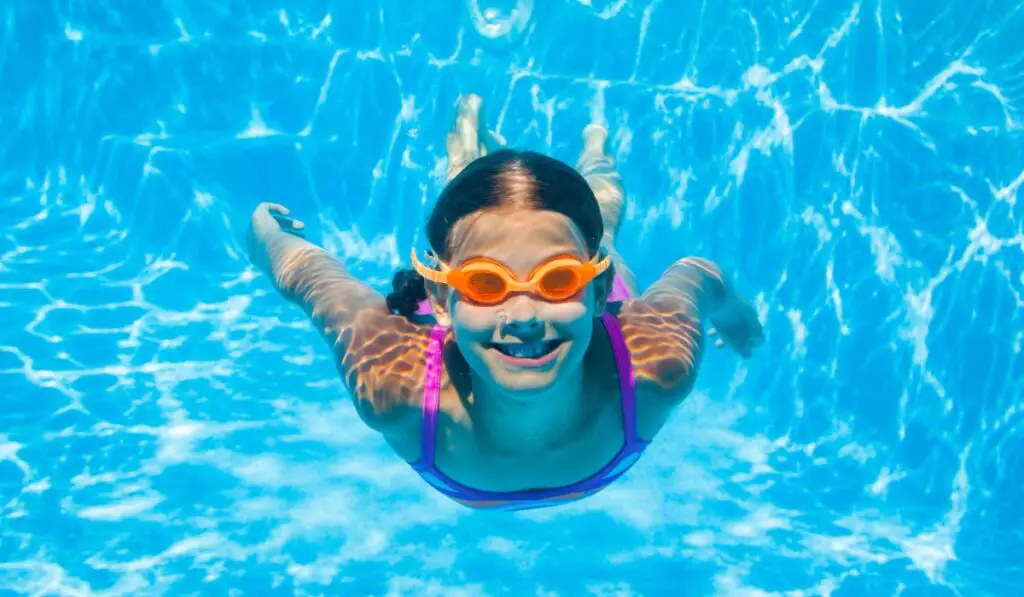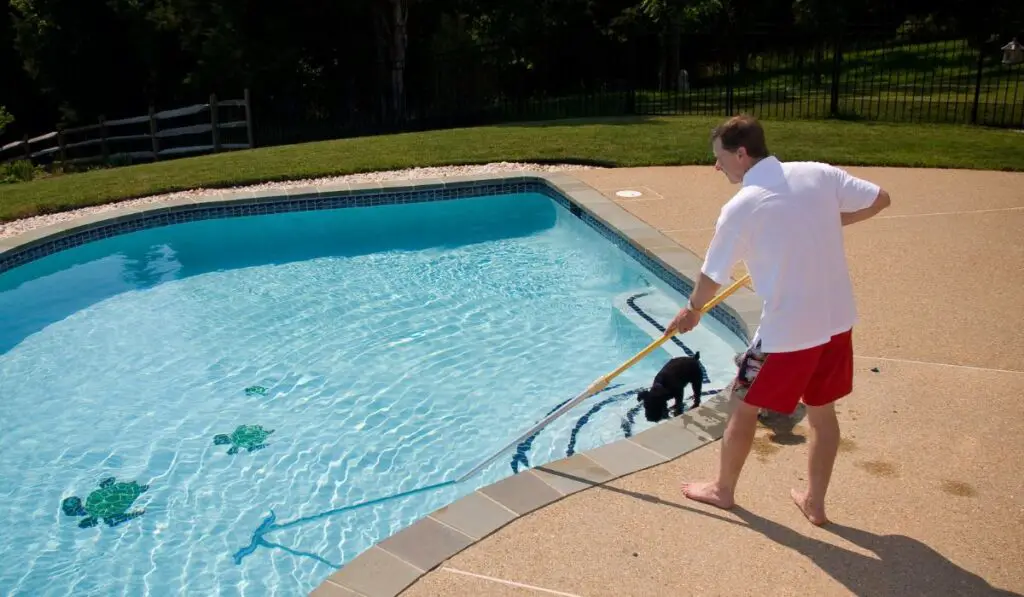It’s incredibly disconcerting to jump into a pool only to find that all the walls feel sticky to the touch. Usually, the floor and walls of your pool feel slippery and slimy due to a lack of proper maintenance. Luckily, a sticky pool is easy to fix and you just need to maintain balanced water chemistry for a clean and bacteria-free pool.
Your pool might feel sticky because of the plasticizers in the vinyl liner, algae, or other contaminants in the water. However, you can easily fix the issue by using a pool vacuum to remove the debris, regularly shocking the pool, and adding a pool surface cleaner to get rid of oily substances.
Stickiness is usually harmless, but it’s a clear sign that your swimming pool is dirty and needs to be properly treated. Let’s look at why your pool feels sticky and what you can do to fix it.
Why Does My Pool Feel Sticky?

There are several reasons why your pool feels sticky, but some of the most common ones include:
Sticky Vinyl Liner
Vinyl liners are made with various plasticizers, which protect the vinyl from damage and prevent it from deteriorating over time. However, these plasticizers seep out onto the liner’s surface and accumulate when the water isn’t circulating.
The layer of plasticizers usually appears clear, but feels sticky to the touch and becomes darker when you brush the liner.
Keep in mind that having a layer of plasticizers on your vinyl liner is perfectly normal and is not a reflection of the quality of the pool water or the liner itself.
Algae
Pools that are not in use tend to have algae blooming on the surface of the water. Most people quickly and effectively fix this issue by adding algaecide. However, when this chemical combines with algae, it forms a black or dark brown goo that makes your pool feel sticky.
Chlorine Goo
Applying a lot of suntan lotion can also result in a sticky pool. These lotions contain carboxylates, which are potassium salts that form a sticky beige or yellow substance when combined with chlorine. This substance then either sticks to the chlorinator or falls to the pool’s floor.
Carboxylates usually take a long time to accumulate, but they can build up quickly if you don’t properly clean your pool.
Pool Contaminants
There are a lot of contaminants that cause pool stickiness, including tree sap, bacteria, and algae. However, regularly scrubbing your pool and treating it with enzymes and chlorine is an effective way to eliminate all contaminants before they become an even bigger issue.
How To Treat A Sticky Pool
It’s extremely easy to fix a sticky pool. Here are a few tips that can help treat and prevent stickiness in your pool water:
- Regularly recirculate the pool water.
- Use a pool skimmer or vacuum to remove debris and other organic matter from your pool.
- Add a pool surface cleaner to the water to dissolve all the oily substances floating in it.
- Shock the pool regularly.
- Enforce a shower rule, so swimmers don’t bring suntan lotions into the water with them.
Why Do I Feel Sticky After Swimming?
Whether you’re swimming in the ocean, a freshwater lake, or a chlorinated lake, chances are you’ll come out feeling stickier than when you went in. This stickiness might happen for one specific reason or a combination of several different reasons, such as:
Chlorine
Most pools are treated with chlorine because it eliminates bacteria and makes the water safe and clean to swim in. However, chlorine breaks down the keratin in your hair, making it frizzy, sticky, and discolored.
Chlorine also strips your hair of all its natural oils, changing its texture and making it brittle. Luckily, you can easily prevent chlorine from damaging your hair by applying oil to your scalp before diving in the water.
Wearing a swimming cap can keep the chlorine and water out of your hair as well. It’s better to opt for silicone swim caps, as they’re usually extra durable and don’t break down in chlorinated water after only a few uses.
Bromine
Bromine is another chemical that’s added to pools to sanitize them. Like chlorine, it also breaks down the keratin in your hair and strips it of all its natural oils. Without keratin, your hair absorbs more chlorinated pool water, which does further damage.
All these changes to the proteins in your hair make it feel incredibly sticky. However, you can prevent bromine from seeping into your hair by wetting your hair just before jumping into the pool to seal it. This will help reduce the amount of bromine your hair can actually absorb.
Soft Water
Soft water usually has low calcium hardness, which makes it more likely to form a layer of sticky foam on the surface of the water. If your pool has soft water, try adding a bit of calcium chloride to your pool and see if that fixes the issue.
Also, you can easily check your pool’s calcium hardness by filling a clean bottle with pool water, adding a bit of liquid soap, and shaking the bottle for a couple of seconds. The more bubbles in the bottle, the softer the water in your pool.
How to Fix a Slippery Pool

Generally, slimy and slippery pool walls are a sign of algae and bacteria growth. If left unaddressed, this problem can turn into a much bigger issue that will require more effort and resources to cure. Here are a few simple ways you can fix a slippery pool:
Clean the Filter
Slimy pool walls are usually one of the first signs of algae growth. To prevent further growth and build-up of algae, make sure you thoroughly clean your pool filter. It’s also important to have a clean filter before adding any pool cleaning chemicals to the water.
Test the Water
Use testing strips (on Amazon) or a testing kit (also on Amazon) to check the water’s chemistry and make any adjustments as needed. It’s best to maintain a pH level between 7.3 and 7.5 for a healthy and functional pool.
Brush and Shock
Use a pool brush to scrub the pool walls and then shock the pool. Make sure you take the capacity and volume of your pool before adding any shock treatment.
Shock treatments are also available in both liquid and granular forms and can quickly sanitize your pool by killing bacterial growth.
